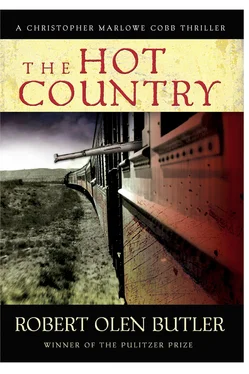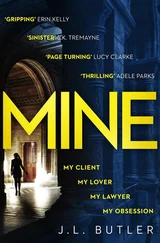A beat of silence passed between us. Even a German would have reasonably understood the words “Good morning” in English. “ Buenos días, ” I replied, offering this to the officer as our common language, but pushing the pronunciation to the back of my throat, tightening my cheeks, applying my mimic’s mouth for German to my fluency in Spanish.
He looked at me for another silent moment, and I could feel him hanging on the edge of belief, still not convinced, but not unconvinced either, as he did not move his eyes from mine for even the briefest moment. I waited, fearing actual, knowledgeable German from him. The Germans had a major presence in Mexico City. This was a smart man. But instead, he said, “ Pasaporte. ”
I pulled my new self from my inner coat pocket without even glancing at it, and I handed it to him, holding my eyes steadily on his. He broke off. He opened my passport to the picture page, as I put my ticket in the conductor’s outstretched hand without a word, without shifting my gaze from the captain, who looked at my image. He lifted his eyes to me directly and then lowered them back to the page. He looked at me in the flesh once again. I very casually took off my hat to reproduce the picture.
I saw his eyes move to the facing page, which had some descriptive information. “You’ve lost some weight,” he said, without looking up. We were speaking Spanish now. That much, at least, seemed to have been established.
I said, “If you would control the rats and the flies and. .” I paused as if looking for a word. And then, quite heavily guttural and loud, I finished my thought: “. . die Scheisse in your streets, I would not catch the dysentery and lose my weight.”
The captain lifted his eyes to me. Slowly. It was meant to be faintly ominous. But the look was also clearly defensive, prideful, a challenge to my criticism of Mexican sanitation. A rebuke. Good.
I rubbed it in. “We are meticulous about these things in my country,” I said.
He took my ticket from the conductor and gave it a very quick glance. “And why are you going to Mexico City?” he said. This was a cheap little trick, and he no doubt knew it, because the smolder in his eyes was no longer suspicion. It had become a look that said: You arrogant German jackass.
“I am not going to Mexico City,” I said. “I am going on to Torreón.”
“And what takes you to Torreón?”
“I am going to wait there with my uncle the banker,” I said, starting to raise my voice, “until fine Mexican soldiers like you, Kapitän, can figure out how to throw the invading American Schweinehunde out of your country.” I was nearly shouting now.
And the captain’s eyes shifted away. He conceded the skirmish, as the train car filled with the responsive cries of “ Viva Mexico! ” and “ Mueran los gringos! ” and even a soft “ Olé! ” from the man with the Díaz mustache sitting next to me.
The captain shut my passport and handed it back to me with my ticket. “Our country has many enemies to fight,” he said.
“None of them are German,” I said. I regretted it at once. I was afraid I was pushing my fake attitudes too far when I’d already said enough. But the bigger regret was still brewing in me, as the captain managed an almost respectful nod of the head. He turned away and led his subordinate and the conductor out of first class and into the second-class car behind us.
When he was gone, the real regret played like a brass band inside my head, made even worse by the admiring looks I was still getting from a dozen Mexican faces wrenched around in my direction. The faces turned away one by one and I was left with that band doing a rendition of “It’s a Grand Old Flag” with all the trumpets and trombones and tubas and one sad alto horn variously playing flats and sharps. A cacophony of Cohan mocking my betrayal of my country in a sordid little play in a first-class car outside Vera Cruz, Mexico. Those Americans I’d publicly called invading Schweinehunde were my pals and drinking buddies and fellow baseball fans and hot dog lovers, and they were lovers of free speech and the free press and freedom of religion, and for them and for me, everybody was welcome and nobody was turned away and anyone had the chance to make himself a millionaire or a doctor or a general or even maybe President of the United States, and anyone could be my pal and my drinking buddy and a Cubs fan no matter where he came from, and damn if I don’t know we fail at all that now and then, and sometimes we fail badly and maybe way too often, but that’s what we believe, and no man has walked the face of the earth who didn’t sometimes fail to live up to what he believes, but we do believe it, we do really believe all that, and now I’d cried out insults to my country in a foreign public place and inflamed hatred for my country in a train car full of people who didn’t truly understand us.
I turned my face to the upswoop of a sand dune out toward the horizon, and right in front of me a wide-winged, ugly-mugged, shit-eating zopilote floated past, and as far as I was concerned at the moment, he could come land on my chest and eat out my traitorous heart if he wanted to, and I wouldn’t even push him away.
But this passed. Pretty quick, though that didn’t mean I was insincere in my guilt. But I figured I’d just played Iago for one performance to a small house in Vera Cruz. And for bigger stakes than applause. I saved my own life, or at least my freedom. And I saved my chance to figure out where this German agent a couple of cars up ahead might be going and what he might be doing that could pose a possible danger to the country I love.
Before we left the federal checkpoint, the captain and his aide stepped back into our car and stopped at the doorway, just beyond arm’s length to my right. I found I was confident now in my role. I looked up at him easily, without any thought that he was here having been nagged by a suspicion about me. He didn’t even glance my way. He said in a loud voice, “Attention. Attention, travelers.”
All the faces in the car turned in his direction.
“For your safety from the foreign invaders and from the bandits who masquerade as so-called Constitutionalists, we will be adding a car of federal soldiers to the back of the train. Please accept our apologies for the brief delay.”
He paused, turning his head slowly, with a faint bounce, to each part of the car, seeming to study every face. He ended by looking across his shoulder and down at me. I gave him an approving nod, which he acknowledged by making no apparent acknowledgment at all. He returned his attention to the car in general.
“ Viva Mexico, ” he said, without raising his voice but with a firmness that filled the place. And like a church congregation, the Mexican travelers answered as one: “ Viva Mexico. ”
Then he strode up the aisle.
I was placid through all of this. But I was glad when, after a few clanking and jostling minutes, the train was moving again and I was officially just one passenger among many, checked and authorized, on his way toward the city of Torreón in the state of Coahuila.
And we began to climb. I leaned my head back against the seat and turned my face to the treetops and the bright morning sky, and I was suddenly alone. I was a man inside a man, Christopher Marlowe Cobb inside Gerhard Vogel, and I was rising high into the air and there was a landscape around me through which I moved and it was real to me but if I put out my hand to actually touch it, I would have been blocked by an invisible barrier. I was contained. I thought this was what the actors felt, all the actors I’d known — the good ones — from before I could remember, this was what they felt inhabiting a role on a stage. This. And it felt safe inside here. And since what my role involved for now was to be silent, I simply watched and waited and prepared for the scenes to come. I drifted inside this space. I prepared.
Читать дальше












